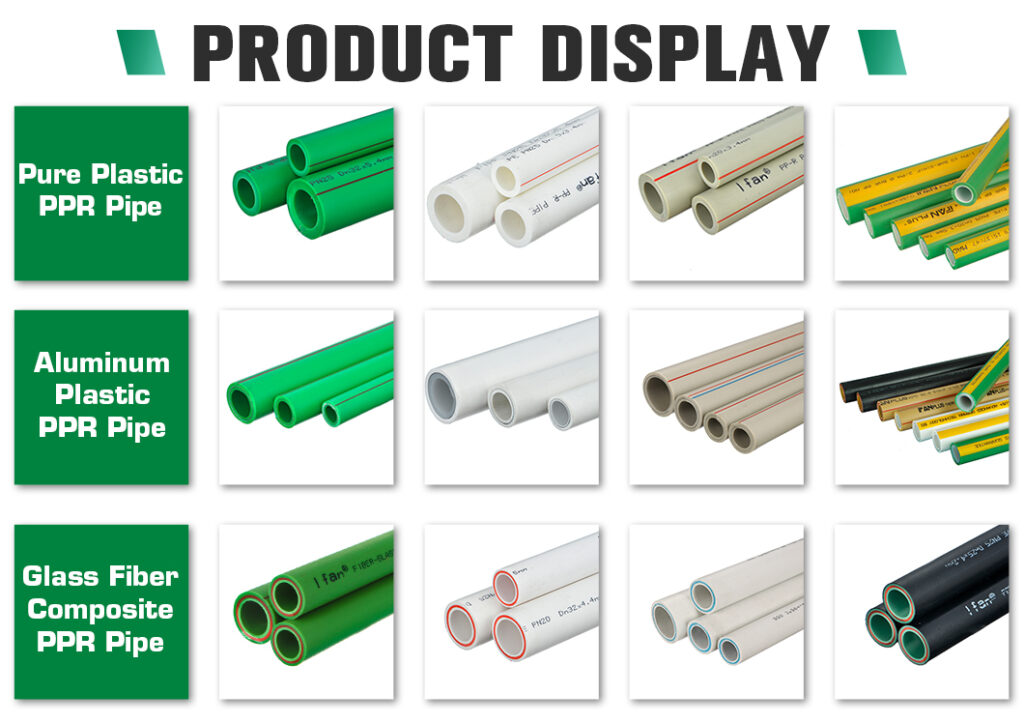The Versatile Applications of PPR Pipes in Various Industries,PPR (Polypropylene Random Copolymer) pipes have proven their worth in a wide range of industries, thanks to their exceptional durability, chemical resistance, and ease of installation. This article explores the diverse applications of PPR pipes across different sectors and the advantages that make them a popular choice.IFAN factory 30+ years manufacture experience support color/size customization support free sample.Welcome to consult for catalog and free samples.This is our FacebookWebsite: www.facebook.com.
Applications of PPR Pipes in Multiple Industries
Construction and Plumbing: PPR pipes are extensively used in plumbing systems for hot and cold water supply. Their resistance to corrosion and smooth interior surface that prevents scaling makes them ideal for maintaining water quality and flow.
Heating Systems: PPR pipes are well-suited for heating systems, including underfloor heating. They can withstand high temperatures, ensuring efficient heat distribution.
Chemical Industry: PPR pipes are used for the transportation of various chemicals due to their resistance to chemical corrosion. They maintain the integrity of the transported substances, making them essential in chemical processing.
Pharmaceuticals: In the pharmaceutical industry, PPR pipes are employed for the distribution of purified water and other critical fluids. Their non-reactive nature ensures the purity of pharmaceutical products.
Food and Beverage Industry: PPR pipes are food-grade materials, making them a reliable choice for transporting potable water and beverages in food processing facilities.
Renewable Energy: PPR pipes are used in solar heating systems to transfer heat-carrying fluids. Their durability and resistance to extreme temperatures are vital for these applications.

Advantages of PPR Pipes
The appeal of PPR pipes in diverse industries can be attributed to their numerous advantages:
Corrosion Resistance: PPR pipes do not corrode, making them ideal for industries where aggressive substances are transported.
High Temperature Resistance: PPR pipes can withstand high temperatures, ensuring reliable performance in heating systems and industrial processes.
Longevity: These pipes have a long service life, reducing the need for frequent replacements and maintenance.
Smooth Interior Surface: The smooth interior surface minimizes friction, allowing for efficient fluid flow and preventing scaling or blockages.
Leak-Proof Joints: PPR pipes can be joined using heat fusion, resulting in leak-proof connections, which are critical for maintaining system integrity.
Future Trends in PPR Pipe Applications
Water Treatment: With an increasing focus on water quality and conservation, PPR pipes will find more applications in water treatment and purification systems.
Green Building: As sustainability becomes a global priority, PPR pipes will play a crucial role in green building practices, reducing water and energy consumption.
Industrial Automation: PPR pipes will be integrated into automated industrial processes due to their resistance to chemicals and extreme temperatures.
Global Expansion: The PPR pipe industry will continue to expand its global presence, catering to the needs of diverse markets and industries.
Research and Development: Ongoing R&D efforts will lead to the development of new PPR pipe variants with improved properties and advanced features.
In summary
PPR pipes have established themselves as a versatile and reliable choice in a multitude of industries. Their resistance to corrosion, high-temperature tolerance, and ease of installation make them a preferred option. As industries continue to evolve, PPR pipes will adapt and find new applications in emerging sectors, further solidifying their importance in various fields. The future of PPR pipes is poised for innovation, growth, and a deeper integration into critical industrial processes.

